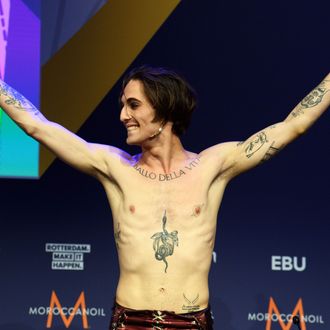
We’ll just call this latest Eurovision controversy out for what it is: non buono. In case you didn’t spend your weekend watching Eurovision, a.k.a. the Olympics That Actually Matter, the rock group Måneskin took home the win for Italy with their performance of “Zitti E Buoni,” which translates to “shut up and be quiet.” When the telecast cameras panned over to the Italians celebrating at a table full of beer and Champagne, some Twitter users noticed that lead singer Damiano David bent his head down onto the table for a moment. Although the view is obstructed, many believed he was snorting drugs in this instance — on live television.
On Sunday, the show’s producer, the European Broadcasting Union, released a statement, saying, “The band have strongly refuted the allegations of drug use and the singer in question will take a voluntary drug test after arriving home.” Furthermore, the band insists that no drugs were present, and the EBU even confirmed that “broken glass was found after an on-site check,” corroborating the band’s story that David was merely bending his head down to examine the broken glass. The EBU will release a statement updating fans on the results of the drug test. Måneskin released a statement on its Instagram Stories, saying, “We really are AGAINST drugs and we never used cocaine.”
We see all of this hullabaloo as deeply hypocritical — glass houses and all that. The Eurovision Song Contest is an institution that is positively fueled by cocaine. Without cocaine, do you think the U.K. would have pulled off this timeless bangeroni to end all bangers in 1996?
Do you honestly believe no cocaine was involved in Ukraine’s 2007 showing?
For Eurovision to tsk-tsk about a bump of coke is like NASCAR getting mad that the vroom-vroom guys put gasoline in their cars. Leave Måneskin be!


